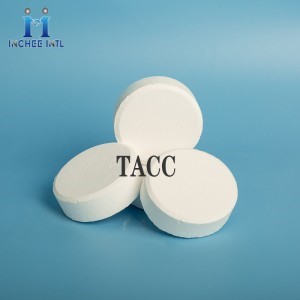Brief introduction:
Trichloroisocyanuric acid, commonly known as TCCA, is a highly effective chloro-isocyanuric acid series product. It appears as a pure white crystalline powder, slightly soluble in water but easily soluble in organic solvents. This versatile chemical compound boasts numerous properties that make it a popular choice in various industries.
Chemical properties: White crystalline powder or granular solid, with strong chlorine irritating taste, containing effective chlorine above 85%, solubility in water is 1.2%, easy to decompose in acid or alkali. It is a strong oxidizing agent and chlorination agent.
Product features:
1, After spraying on the crop surface, it can release hypochlorous acid and has a strong ability to kill bacteria, fungi and viruses.
2. The starting material of trichloroisocyanuric acid is rich in potassium salt and a variety of trace element groups. Therefore, it not only has a strong ability to prevent and kill bacteria, fungi and viruses, but also has the role of promoting crop nutritional growth.
3, trichloroisocyanuric acid has a strong diffusion, internal absorption, conduction, penetration of pathogenic microorganisms cell membrane ability, can kill pathogenic microorganisms within 10-30 seconds, for fungi, bacteria, viruses, difficult diseases, with protection, treatment, eradication of triple effect.
Application:
With its exceptional bactericidal properties, Trichloroisocyanuric acid is widely used as a potent bactericide for industrial water, swimming pool water, hospitals, and even tableware sterilization. Its ability to eliminate harmful bacteria and disinfect water has earned it a remarkable reputation in the market. Many industries rely on TCCA to ensure the safety and cleanliness of their water systems.
One of the major applications of Trichloroisocyanuric acid is in industrial circulating water. In industrial settings, the quality of circulating water is of utmost importance to maintain optimal conditions for production processes. However, water carries various microorganisms that can cause detrimental effects. Trichloroisocyanuric acid offers a reliable solution by effectively neutralizing bacteria, viruses, and fungi present in the water. This ensures a clean and safe working environment for employees and helps prevent any potential contamination.
Another significant use of Trichloroisocyanuric acid is in swimming pool water treatment. Swimming pools are prone to bacterial growth and other harmful microorganisms due to the warm and humid environment. TCCA effectively eliminates these microbes, keeping the water clean and safe for swimmers. Additionally, it helps maintain the pH level of the water, preventing the growth of algae and reducing the need for excessive chlorine usage.
Apart from its applications in industrial and recreational settings, Trichloroisocyanuric acid also plays a crucial role in maintaining hygiene in hospitals. With its powerful disinfectant properties, TCCA helps sterilize medical equipment, patient care areas, and surfaces, reducing the risk of infections and ensuring a safe environment for both patients and healthcare providers.
The broad development and utilization prospects of Trichloroisocyanuric acid make it an invaluable chemical compound in various sectors. Its versatility and effectiveness have led to its widespread adoption, ensuring the safety and cleanliness of water systems and other applications.
Danger: Trichloroisocyanuric acid belongs to Class 5.1 oxidant, is a dangerous chemical, white crystalline powder or granular solid, with a strong chlorine irritating smell. It is mixed with ammonium salt, ammonia and urea to produce explosive nitrogen trichloride, which is also released in case of moisture and heat, and flammable in case of organic matter. Harmful combustion products: carbon monoxide, carbon dioxide, nitrogen oxides, hydrogen chloride. The powder can strongly irritate the eyes, skin and respiratory system. When exposed to high heat or water, it can produce corrosive fumes containing chlorine or other toxic gases. Can not be used on people. Trichloroisocyanuric acid will decompose when encountering a small amount of water, and accompanied by strong thermal effect, this thermal effect will further promote its thermal decomposition conditions, resulting in harmful smoke; In addition, trichloroisocyanuric acid should not be used in a concentrated solution or slurry, because the concentrated solution or slurry can easily decompose to produce nitrogen trichloride (an explosive chemical gas with tear-jerking effect). When preparing and using, pay attention to control the heating temperature, prevent violent stirring, and comply with the operating procedures to meet the safety requirements. Isocyanuric acid, the hydrolytic product of trichloroisocyanuric acid, slowly breaks down into NH3 and CO2.
Product storage: Products should be stored in a cool, dry, well-ventilated warehouse, moisture-proof, waterproof, waterproof, fireproof, isolated fire and heat sources, prohibited with flammable and explosive, spontaneous combustion and self-explosion and other substances mixed, not oxidizing agents, reducing agents, easy to be chlorinated, oxidizing substances mixed storage. It is absolutely prohibited to mix and mix with liquid ammonia, ammonia water, ammonium carbide, ammonium sulfate, ammonium chloride urea and other inorganic salts containing ammonia, ammonium, amine and organic matter, otherwise it is easy to explode or burn, and do not contact with non-ionic surfactants, otherwise it is easy to burn.
Product transportation: The product can be transported by train, car, ship and other means of transportation. During shipment, the packaging should be prevented from breaking, fireproof, waterproof, moisture-proof, and shall not be mixed with ammonia, ammonia water, ammonium salt, amide, urea, oxidant, non-ionic surfactant, inflammable, explosive and other dangerous goods.
Post time: Aug-15-2023


